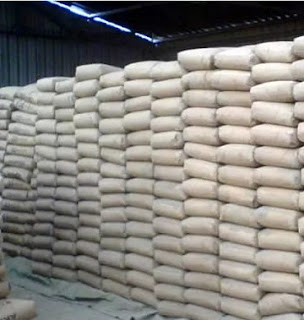CHANGE?: Cement Price Soars FROM N1700 To N2300 Within 24hrs; Dangote Others Keep Mum
News Proof 31.8.16 No comments Edit Post
New Telegraph: Cement manufacturers yesterday shocked home seekers and builders by suddenly increasing the price of a 50 kilogramme bag of cement by 35.2 per cent from N1,700 to N2, 300 in 24 hours. As at Monday, the product was still sold at N1,700 per bag.
The major price increase is coming at a time when Nigerians are passing through a difficult economic situation and when everybody believes that the country is self-sufficient in cement production.
Homebuilders who bought some bags of cement on Monday at N1,700 in Lekki, Lagos, could not understand happenings in the building materials market, as they were told by traders that cement price had increased to N2,300.
A survey by New Telegraph further revealed that while the product is sold at N2,300 in Lekki corridor, it is being sold between N2,150 and N2,200 in Ikeja, Mowe and Ibafo axis of Ogun State. When this newspaper made enquiries, a cement retailer in Ibafo, Mrs. Ibidun Oke, said: “That is how we see it.
My supplier just told me yesterday (Monday) that cement price has gone up from the factory. You know we are in change period and many things have happened since this government came on board.”
Efforts to get spokespersons of Cement Manufacturers’ Association of Nigeria (CMAN) and Dangote Cement Plc., Mr. Salako Salako, and Tony Chiejina, respectively to commend on the situation proved abortive as the duo did not pick their calls or respond to text messages sent to them.
Lamenting over the situation, Managing Director of Megamound Investment Limited, developer of Lekki County Homes, Mr. Olumide Osunsina, said he foresees massive job loss and dearth of affordable housing in the sector if the situation persists. He said that he got to know about the price increase on Tuesday morning.
Osunsina said that the increase in cement price was too much, adding that developers may have no option than to limit housing construction activities and also increase house price to stay afloat.
Effects of construction activities, Osunsina said, would lead to sack of construction workers, high cost of housing units and increase homelessness among Nigerians.
Former President of the Nigerian Institute of Building (NIOB), Mr. Chuks Omeife, said that the latest hike in cement price was confusing. “We don’t know what is going on here. We are confused because there is no explanation adduced for it,” he said.
However, he blamed the situation on foreign exchange and monopolistic nature of cement manufacturers in Nigeria. If the situation persists, Omeife stated that housing projects are going to be delayed with increase in cost of delivering affordable units.
He said: “If the price increase in cement remains for a long time, it is going to compound the problems of affordable housing in the country because it will trickle down to block manufacturers and artisans.”
Cement is a major component used for building production process, especially in Nigeria. Dangote Cement Plc. and Larfarge Africa are major manufacturers of the product in Nigeria.
The major issue raised recently by cement manufacturers was about lack of gas supply owing to the blowing up of oil and gas pipelines by militants in the Niger Delta region.
Nigeria is currently facing one of its worst financial crisis in decades, coupled with inflation rising, the economy weakening and production of oil, which provides the bulk of export earnings, down since last February as militants attack pipelines.
Economic output will probably shrink 1.8 per cent this year, the first contraction in more than two decades, the International Monetary Fund (IMF) said recently.
Besides, pressure is also building, with bank loan books – nearly half of them in dollars – hammered by a shrinking economy, a plunging currency and acute foreign exchange shortages in Africa’s biggest oil producing nation following the slump in oil prices.
As at yesterday, the naira had slumped further at the parallel market to N418 per dollar, while it traded on the interbank at N305. These developments have raised the cost of living in the country without any corresponding increase in wages of citizens.
Document Non-Documented Ex-Militants - Abugor Advises FG On Solution To Bombings In N'Delta Region
Relief Beckons As B'Haram Also Agrees To Come Out From Hiding For Peace Talk, Release Of Chibok Girls
Subscribe to:
Post Comments (Atom)


No comments